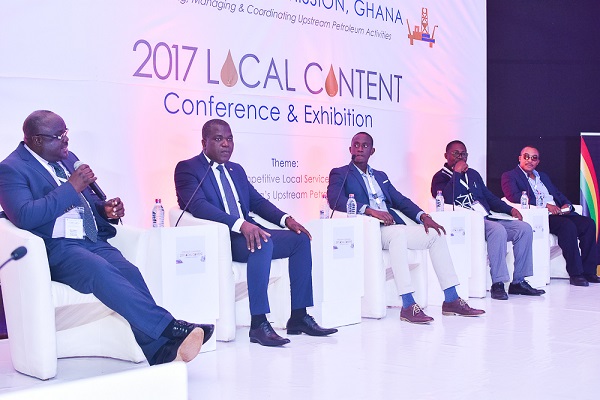
Reaping the benefits of oil discovery in local content lies our redemption
In just a decade after the discovery of another natural resource, oil and gas in commercial quantities, Ghana seems to be making a strong case for itself by putting various frameworks in place to protect the interest of its people.
Within a short time, the country has in place a robust regulatory system supervised by the Petroleum Commission. It also has the Local Content and local Participation Act.
It also has in place the Petroleum Management Act as well as public interest and accountability committee (PIAC), free media and other civil society groups that take keen interest in the development within the oil space.
Hydrocarbon potential
Key among the institutions is the Petroleum Commission (PC) which sets out to promote the country’s hydrocarbon potential, ensure sustainable cost effacement petroleum activities for the overall benefit and welfare of resource owners.
Fundamental amid them is the monitoring and ensuring compliance with national policies and laws relating to the upstream petroleum industry in the country which also promotes indigenous ownership and participation in the industry.
As part of its effort to keep the industry abreast of the development in the industry, and encourage local content and local participation in the upstream industry in the country, the commission has instituted an annual Local Content Conference and Exhibition.

Dr. Baah-Nuako of GNPC welcoming acting Chief Executive of the Petroleum Commission (PC) Egbert Faibille Jnr and his team to stand
The concerns
The conference provided the opportunity for local companies to exhibit their services to the industry and share with industry players, government officials and regulators the challenges they face.
This year’s theme: ‘Developing Competitive Local Content Service Providers and Personnel in Ghana’s Upstream Petroleum Industry’ saw large number of indigenous local service providers, banks, insurance companies participating in the conference and exhibition.
The participants, who took turns to do presentations, identified funding, upfront payments, taxation, lack of tax breaks, high interest rates, exchange rate fluctuations and market volatilities at the face of highly capital intensive industry as some of the challenges.
The companies made it clear to the industry regulator that they struggled to access funding for the projects as suppliers demanded upfront payment for their goods.
The local companies said also that they had to take loans to pay all forms of taxes before they received payment from their contractors, 60 to 90 days after the execution of contracts.
Tax breaks
For the industry to grow, the local companies appealed to the government, through the PC, to ensure that some support, in the form of tax breaks, was extended to them, since they were already burdened by the credit from the financial institutions.
They reminded the PC of high import duties at the ports which also resulted in high cost of operation considering their level of contribution to the nation and building the sector together.
Tullow
The lead operator of the first and second independent oil fields, Tullow Oil Ghana, outlined its key achievements in promoting the industry, which included the creation of opportunities for local companies by unbundling (sub-dividing) contracts as well as reserving contracts just for them.
It said the company was committed to the process by adhering to the local content rules in all aspects of the tendering process and by creating enough duration for bidding for contracts to enable local companies to tender as a way to build local capacity.
It also ensured that supplier development initiatives were in place to ensure pre-tender/post-tender general awareness and feedback seminars to sensitise suppliers on requirement for our tendering activities.
It took the opportunity to educate the local companies on some of the lapses in their tendering process to enable them see some of the avoidable mistakes.
Why the local content law

Acting Chief Executive of the Petroleum Commission (PC), Egbert Faibille Jnr
The Chief Executive Officer of the Petroleum Commission, Mr Egbert Faibille Jnr.,said the discovery of oil and gas in commercial quantities in 2007, and its subsequent production in 2010, raised the expectations of Ghanaians as to the impact of the oil find on the national economy and their individual well-being.
It, therefore, became imperative for the government to create the enabling environment for indigenous companies to take full advantage of the services, where practicable.
The efforts culminated in the development of the Local Content Policy for the industry and subsequently, the promulgation of the Petroleum Local Content and Local Participation Regulations, 2013 (L.I.2204).
He said the L.I. 2240, was carefully crafted to achieve local content and participation on an incremental basis over a period of time and that a lot had been achieved and a lot more to go.
